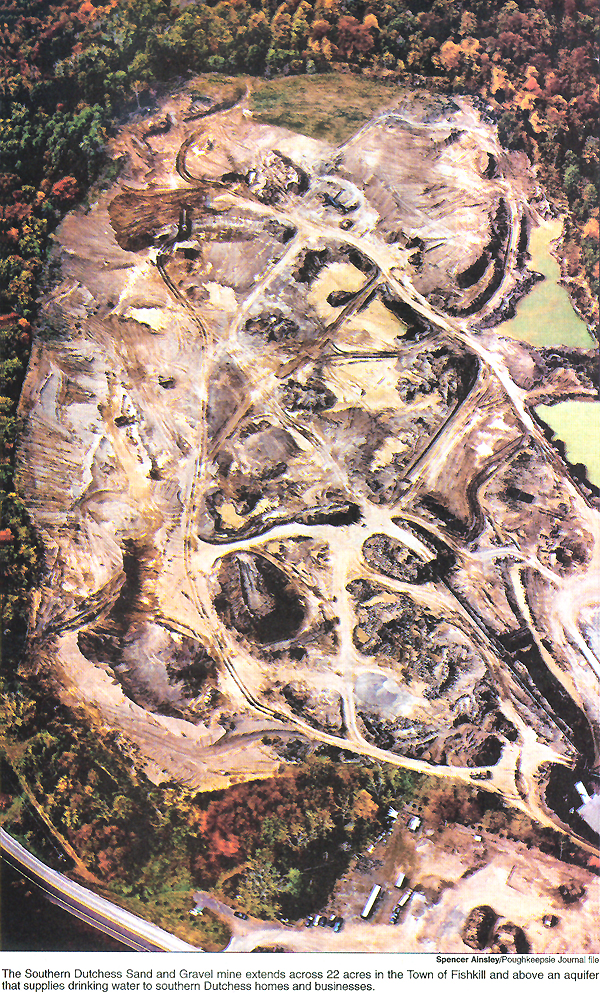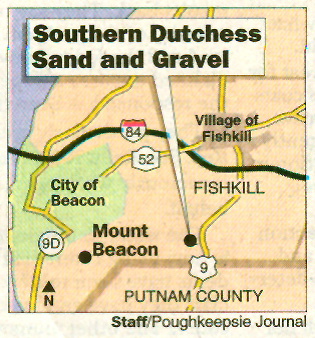

Wednesday, July 9, 2003
Mining project getting a lax review

State officials are dangerously close to putting a major water source in Dutchess County in peril.
They shouldn't do it.
They have before them a proposed mine expansion in Fishkill -- one that could harm the aquifer supplying drinking water to at least 10,000 Dutchess residents.
The state Department of Environmental Conservation has already determined a full-scale environmental review of this project is unnecessary. That determination was made too quickly, and it raises numerous questions about DEC enforcement policies. Consider:
- This mine expansion would get rid of natural sand and gravel filters that protect the aquifer.
- These filters are a vital safety net -- just upstream of the aquifer are businesses, including junk yards and repair shops, that could leak potentially dangerous chemicals in water sources.
- The state DEC didn't even notify the Village of Fishkill, which owns crucial wells about a mile downstream from the mine, that the project was being reviewed. Those wells supply water for five municipalities, including the village.
- The project could hit the residents of East Fishkill's Shenandoah area with a double whammy. Their groundwater is already polluted. They may need to use the Fishkill aquifer as a source of drinking water. "We cannot be victimized again," Shenandoah resident Denis Callinan says.
- Even some officials who support the project say it would be different if a new company were involved, instead of an established one.
Government officials have been far too lax in dealing with this project.
Southern Dutchess Sand and Gravel wants to dig below the water table, about a mile upstream from the municipal wells. Its goal is to remove roughly 2 million cubic yards of sand and gravel in the next decade or two from its mine near the Putnam County border.
A 22-acre lake would be left in its wake. The company -- part of the Montfort Group's 75-year-old family business -- argues that mining below the water table is common and safe, and that it is being done at several other mines in Dutchess County.
Water security must be priority
The mine would have to close as early as next year without the expansion, leaving 10 mine employees -- and potentially more -- out of work if the company can't find another source of raw material. Supporters of the mine say the DEC must take these matters into consideration.
No, it shouldn't. The DEC's main responsibility here is to protect water sources, and this is a major one in a populated area. Mining into the aquifer makes it more vulnerable to pollution. If any of the wells become contaminated, a costly filtration system would be needed to provide clean water to the residents.
Fishkill Supervisor Joan Pagones said the matter is up to the DEC. But she also conceded that if this proposal involved an out-of-area company, rather than one with long-standing local track record, she might have more reservations.
DEC Administrative Law Judge Richard Wissler will decide whether the DEC should reconsider any environmental issues before granting the mine permit.
A full-blown environmental review is needed and should be ordered on the basis that the DEC failed to consider important factors.
For one, it was only after the permit process had started that DEC discovered a pipe bringing industrial and highway runoff to the proposed lake site and, potentially, the aquifer.
The company says it will rectify this problem, but the DEC should have investigated the site more thoroughly before declaring a stringent environmental review wasn't necessary.
The mining company also has agreed to install groundwater monitoring wells to detect pollution before it reaches the village wells. But this will identify problems only after they occur. It's too late then.
Local communities deserve no less protection than New York City, which keeps its water supply safe by maintaining a series of rigorously enforced buffer zones around upstate watersheds where development is restricted.
That isn't being done for other public water supplies in the valley. About two-thirds of Dutchess residents rely on groundwater for their drinking water, whether through public systems or directly from private wells. Others rely on treated water from the Hudson River.
State officials say the mine is unlikely to cause any damage to the aquifer, but they're gambling at high stakes with a major Dutchess County water source. They shouldn't take the risk.
Dutchess County's water sources are being threatened more each day -- by chemical spills, unbridled growth, even our personal habits.


| Back to index |
| Watershed Home | Media Menu |